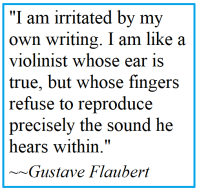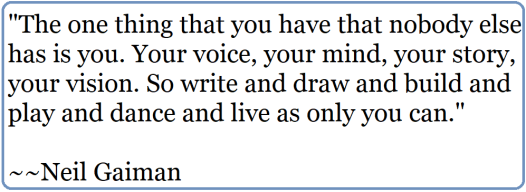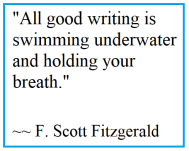The craft of writing involves learning the rules of grammar, developing a broader vocabulary, learning how to develop characters, build worlds etc., etc. Most of us don’t have the money to embark on an MFA program in writing. Instead, we educate ourselves as well as we can.
 Even if you have an MFA degree, you could spend a lifetime learning the craft and never learn all there is to know about the subject. We join writing groups, buy books, and most importantly, read. We analyze what we have read and figure out what we liked or disliked about it. Then, we try to apply what we learned to our work.
Even if you have an MFA degree, you could spend a lifetime learning the craft and never learn all there is to know about the subject. We join writing groups, buy books, and most importantly, read. We analyze what we have read and figure out what we liked or disliked about it. Then, we try to apply what we learned to our work.
Most writing advice is good because it reinforces what we need to know about the craft, and simple sayings are easy to remember. They encourage us to write lean, descriptive prose and craft engaging conversations.
The same advice can be bad because it is so frequently taken to extremes by novice authors armed with a little dangerous knowledge.
- Remove all adverbs.
This advice is silly. Without descriptors, you can’t show mood, atmosphere, or setting. Remember, not all adverbs end in “ly,” so use a little common sense and don’t use unnecessary adverbs.
I am a wordy writer and a poet. I love words in all their many shapes and forms. I know readers like lean prose, so I work to trim it, sometimes more successfully than others. In the second draft, I use the global search (find option) to look for each instance of ‘ly’ words and rewrite those sentences to make them more active.

- Don’t use speech tags.
Well, that makes things pretty confusing. Who said that, and why are there no speech tags in this nonsense?
- Show, Don’t Tell. Don’t Ever Don’t do it!
We’ve all experienced intensely painful feelings, such as fear, sadness, and anger. If you have shared your work with a writing group, you have been admonished to show these emotions rather than saying, “Joe grew angry.”
You can see their point. So, you sit down and rewrite your scene graphically: Joe snarls, cheeks going hot, brows pulling together, eyes glaring, lips curling in a sneer, and fists clenching. Edith sits hunched in on herself with drooping shoulders, downturned quivering lips, shaking hands, nausea rising, and tear-streaked cheeks.
Maybe that much detail is necessary, but maybe it’s not. Set that scene aside and come back to it later. Then look at it with fresh eyes and decide what will be enough to show their emotions and what is too much.
An avalanche of microscopic showing can make your characters seem melodramatic and sometimes cartoonish. Truthfully, that much physical drama doesn’t show a character’s emotions. What is going on inside their heads?
You must either relay the thought process that led to those physical reactions or lay the groundwork with some crucial bits of exposition.
- Write what you know.
Your life experiences shape your writing, but your imagination is the story’s fuel and source.
- If you’re bored with your story, your reader will be too.
 You have just spent the last year or more combing through your novel. This is another example of silly advice that doesn’t consider how complex and involved the process of getting a book written and published is. I love writing, but when you have been working on a story through five drafts, it can be hard to get excited about making one more trip through it, looking for typos.
You have just spent the last year or more combing through your novel. This is another example of silly advice that doesn’t consider how complex and involved the process of getting a book written and published is. I love writing, but when you have been working on a story through five drafts, it can be hard to get excited about making one more trip through it, looking for typos.
- Kill your darlings.
I’ve said this before, but it bears repeating. We can’t be married to our favorite prose. When a paragraph or chapter we love no longer fits the story, we must cut it, save it in a separate file, and move on.
However, cutting a passage just because you like it is stupid. Maybe it does belong there—maybe it is the best part of that paragraph.
- Cut all exposition.
BE reasonable. Some background information is essential to making the story understandable to a reader. How, when, and where you deploy the exposition is what makes a great story. Hold the deep history back – like a magician, only produce the backstory at the time and place where the characters and the reader need to know it.
Good advice taken to an extreme has become a part of our writing culture. This is because all writing advice has roots in truth.
- Too many descriptors can ruin the taste of an author’s work.
- Too many speech tags can stop the eye, especially if the characters are snorting, hissing, and ejaculating their dialogue.
- Too much telling takes the adventure out of the reading experience.
- Too much showing can be tedious and is sometimes visually revolting.
Our task is to find that happy medium between too much and not enough. Our voice and writing style reflect our thought processes and the way we strive for balance.
 When we first embark on learning this craft, we latch onto handy, easy-to-remember mantras because we want to educate ourselves. Unless we’re fortunate enough to have a formal education in the art of writing, we who are just beginning must rely on the internet and handy self-help guides.
When we first embark on learning this craft, we latch onto handy, easy-to-remember mantras because we want to educate ourselves. Unless we’re fortunate enough to have a formal education in the art of writing, we who are just beginning must rely on the internet and handy self-help guides.
Something to remember: most readers are not editors. They will either love or hate your work based on your voice, but they won’t know why. Voice is how you break the rules, but you must understand what you are doing and do it deliberately. Craft your work so it expresses what you intend in the way you want it said. So, the most important rules are:
- Trust yourself,
- Trust your reader.
- Be consistent.
- Write what you want to read.
 We can easily bludgeon our work to death in our effort to fit our square work into round holes. In the process of trying to obey all the rules, every bit of creativity is shaved off the corners. A great story with immense possibilities becomes boring and difficult to read. As an avid reader and reviewer, I see this all too often.
We can easily bludgeon our work to death in our effort to fit our square work into round holes. In the process of trying to obey all the rules, every bit of creativity is shaved off the corners. A great story with immense possibilities becomes boring and difficult to read. As an avid reader and reviewer, I see this all too often.
Great authors work to learn the craft of writing and apply writing advice gently. Their work stays with the reader long after the last line has been read.








Reblogged this on Jeanne Owens, author.
LikeLiked by 1 person
Thank you for reblog ❤ 😀
LikeLiked by 1 person
You’re welcome 🙂
LikeLiked by 1 person
These are excellent points to go over again and again because we tend to forget. I think the best advice is to Write What You Want To Read. It will have a passion that some readers will feel.
LikeLiked by 1 person
Hello Darnell! You are right. Those are the stories that seem to write themselves. I agree, their power comes from the author’s passion.
LikeLiked by 2 people
Thank you for the examples from both sides of the writing advice and the reminder about voice and writing what we want to read.
LikeLiked by 1 person
Thank you for the kind words, Marlee!
LikeLike
For me the most detrimental advice is to use “deep point of view.” Everything must be shown from a point of view character. The ancient and (by me anyway) beloved voice of the Story Teller has become verboten to many. After spending a great deal of time and effort in various workshops, I found that deep point of view inhibited my creativity making it difficult to enjoy writing and slowing my writing process down. I am even now in recovery. As an antidote, I’m reading novels written by authors not afraid of their own voices.
LikeLiked by 2 people
Hello! I agree – no point throwing the baby out with the bathwater (to use a favorite cliche). I love Tolkien and his style of prose is sometimes reviled by modern reviewers, so there you go. Thank you for stopping and commenting!
LikeLike
So much truth!
Over thinking writing advice can be detrimental. Whenever I get writer’s block, I can usually pinpoint a faulty piece of advice as being the source of bother.
LikeLiked by 1 person
Aw. You need a hug – don’t let it take the joy out of writing. We all have that problem. Thank you for commenting!
LikeLike
I can appreciate this post, Connie! Much writing advice is really shorthand for worthwhile practices, but unless a writer learns the nuances, they may misinterpret or take it to extremes.
LikeLiked by 2 people
Hello Audrey! I agree. Learning the balance between enough and too much is one of the hardest parts of the process. We want our work to be liked, and sometimes we get over-eager in our effort to please everyone. It’s not possible, but we try.
LikeLiked by 1 person
A sensible take on all those mantras we’re told. I agree wholeheartedly.
But we must remember that what we are writing is our own work, and we don have to do what our critique groups tell us if we think it’s wrong for our work.
LikeLiked by 1 person
Hello! I agree. It’s your creation and vision. If what you’re being told will help that vision along, that is wonderful, but sometimes you must hold the line. Otherwise, it becomes a committee’s vision.
LikeLiked by 1 person
Reblogged this on coffee2words.
LikeLike
❤ Thank you for the reblog!
LikeLiked by 1 person
Connie, you couldn’t be more right about the aspects you’ve touching on. I write my 1st novel (still to be published) before I had read so many articles online about the craft. I let the story guide me with such things as adverbs, exposition, speech tags, etc. Although the novel definitely needs a professional edit, I’m satisfied with my 1st book. I believe all should be done, accept, and adhered to in moderation.
LikeLiked by 2 people
Thank you for the kind words, and congratulations on finishing your book. There is no better feeling than that of having written it all the way to the proper ending. 😀
LikeLiked by 1 person
Reblogged this on Chris The Story Reading Ape's Blog.
LikeLiked by 1 person
Thank you, Chris.
LikeLiked by 1 person
A sensible take on writing. I enjoyed this and thought it, to the point, as well as particularly good advice.
LikeLiked by 1 person
Thank you for the kind words!
LikeLike
Reblogged this on Kim's Musings.
LikeLiked by 1 person
Thank you for the reblog!
LikeLike
Reblogged this on NEW BLOG HERE >> https:/BOOKS.ESLARN-NET.DE.
LikeLike
Thanks for another great advices, Connie! I think one day adverbs will kill me. Lol Beeing honest, i never had lost any thoughts on adverbs. They existed, but nothing more. But now as a upcoming reader i more and more see the importance of them for more expressive writing. xx Michael
LikeLiked by 1 person
Thank you, Michael, and thank you for the kind words.
LikeLike
Great post! Balance is everything.
LikeLiked by 2 people
Thank you for the kind words!
LikeLike
Reblogged this on Michael Seidel, writer and commented:
It’s easy to get lost in all the rules and advice. The best piece is probably still, write what you want to read.
LikeLiked by 2 people
❤ So true. And thank you for the reblog!
LikeLiked by 1 person
Nice and thanks for the advice it helps us bloggers a lot when curating blog posts🕯🕯😊
LikeLiked by 1 person
Hello and welcome! I’m glad you find it useful. And thank you for visiting. 😀
LikeLiked by 1 person
You’re welcome👏😊
LikeLike
Reblogged this on wordrefiner.
LikeLike